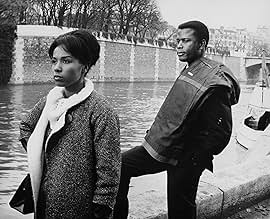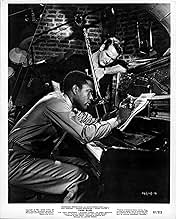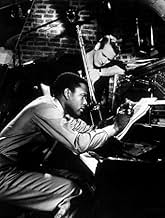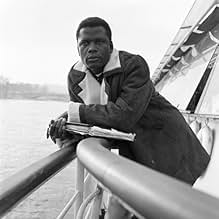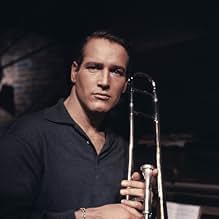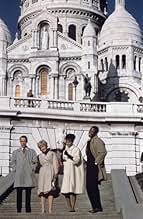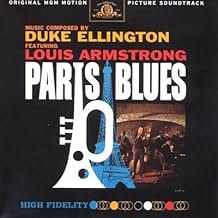IMDb RATING
6.7/10
4.2K
YOUR RATING
During the 1960s, two American expatriate jazz musicians living in Paris meet and fall in love with two American tourist girls.During the 1960s, two American expatriate jazz musicians living in Paris meet and fall in love with two American tourist girls.During the 1960s, two American expatriate jazz musicians living in Paris meet and fall in love with two American tourist girls.
- Nominated for 1 Oscar
- 2 nominations total
Guy Pedersen
- Bass Player
- (as Guy Pederson)
Roger Blin
- Guitarist Fausto the Moor
- (uncredited)
Charles Bouillaud
- Luggage Carrier in Train
- (uncredited)
Michel Dacquin
- Guest at Devigne's Party
- (uncredited)
Hélène Dieudonné
- The Pusher
- (uncredited)
Michel Garland
- Club 33 Customer
- (uncredited)
Storyline
Did you know
- TriviaPaul Newman was coached in playing the trombone by Billy Byers, while the playing for Newman on the soundtrack was done by Murray McEachern. Sidney Poitier's tenor sax playing was done by Paul Gonsalves. The soundtrack was recorded May 1-3, 1961 at Reeves Sound Studios in New York City.
- GoofsSome may believe that the mouthpiece ligature on the tenor saxophone that Eddie Cook (Sidney Poitier) plays is upside down. However, in the first scene when the band is playing, it can be seen that the thumbscrew that adjusts the ligature is on the bottom, where it normally would be. It is, therefore, not upside down.
- Crazy credits"Introducing" Serge Reggiani, who by 1961 had been in French films for 20 years and a star at least throughout the 1950s.
- ConnectionsFeatured in A Century of Black Cinema (2003)
- SoundtracksTake The 'A' Train
(uncredited)
Music by Billy Strayhorn
Recorded at Reeves Sound Studios, New York on May 2 & 3, 1961.
Label - United Artists
Featured review
Within 2 years of "Paris Blues" being released the US involvement in Vietnam began to sour the relationship between America and la rive gauche. French intellectuals affected to disdain the United States and all its works;one of the few aspects of Americana that were permitted to be still admired was jazz music. Even so the myth of the American jazz musician as a god-like figure had faded by the mid sixties.Giants like Louis Armstrong and Duke Ellington were still revered but the journeymen jazzers like Ram Bowen(Newman)no longer filled the clubs just because they were American. The Indian Summer of America's honeymoon with Europe peaked with "Paris Blues".
Beautifully shot in black and white in the quintessentially Parisian parts of the city where the 2 pairs of lovers could stroll hand in hand photogenically it was a love letter to the arondissements beloved of Scott Fitzgerald,Hemingway and Gertrude Stein 30 years after the affair had ended.
Paul Newman was never more charming,Sidney Poitier never more cool and self-effacing;their pairing considered quite daring at the time coming just a few years after the ground-breaking "The Defiant Ones". Duke Ellington wrote the score and his "Mood Indigo" is beautifully played by Murray McCeachern.Louis Armstrong plays himself - why his character is named Wild Man Moore one can only speculate.
I saw "Paris Blues" when I was 20 years old and my love affair with jazz was a its height. Looking at it now it doesn't seem all that special,the characters and situations have all become clichés;but perhaps that's a bit like saying "Hamlet"'s a good play but it's full of quotations.
Beautifully shot in black and white in the quintessentially Parisian parts of the city where the 2 pairs of lovers could stroll hand in hand photogenically it was a love letter to the arondissements beloved of Scott Fitzgerald,Hemingway and Gertrude Stein 30 years after the affair had ended.
Paul Newman was never more charming,Sidney Poitier never more cool and self-effacing;their pairing considered quite daring at the time coming just a few years after the ground-breaking "The Defiant Ones". Duke Ellington wrote the score and his "Mood Indigo" is beautifully played by Murray McCeachern.Louis Armstrong plays himself - why his character is named Wild Man Moore one can only speculate.
I saw "Paris Blues" when I was 20 years old and my love affair with jazz was a its height. Looking at it now it doesn't seem all that special,the characters and situations have all become clichés;but perhaps that's a bit like saying "Hamlet"'s a good play but it's full of quotations.
- ianlouisiana
- Nov 3, 2005
- Permalink
- How long is Paris Blues?Powered by Alexa
Details
- Release date
- Country of origin
- Languages
- Also known as
- Паризький Блюз
- Filming locations
- Production companies
- See more company credits at IMDbPro
Box office
- Gross US & Canada
- $1,300,000
- Runtime1 hour 38 minutes
- Color
- Aspect ratio
- 1:66
Contribute to this page
Suggest an edit or add missing content



